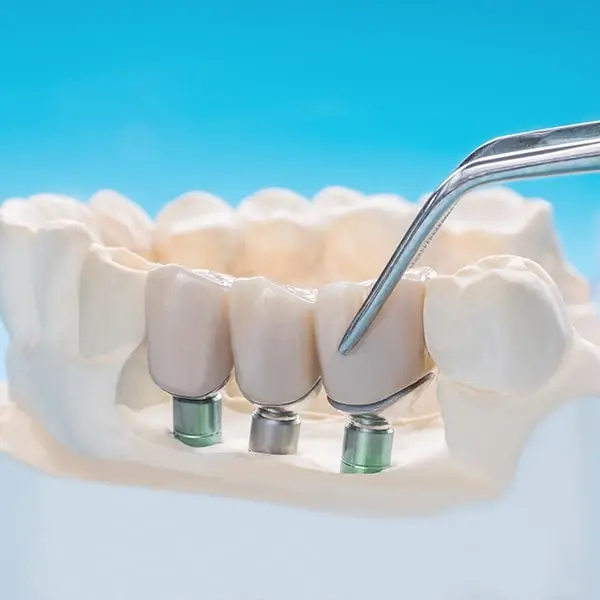Dental bridges can help to restore your smile and improve your quality of life. Magnum Clinic offers high-quality dental bridges that can give you the confidence to show off your smile again.

A dental bridge is a dental restoration that bridges or replaces the gap between two adjacent teeth. It is made of two dental crowns on either side of the missing tooth, with a pontic in between. The pontic can be made from either porcelain or metal(these are the types of materials used to fabricate fixed/ dental bridges). Dental bridges are used to replace one or more missing teeth and are fixed in place using dental cement.
When a tooth is lost, the adjacent teeth can start to move and shift out of place. This can cause a number of problems, including difficulty, chewing and speaking, and an increased risk of tooth decay and gum disease.
Longer run, if missing teeth are not replaced patient, will lose occlusion, and the facial profile will alter.
There will also be differences in the speech.
There are three types of dental bridges:
1. traditional fixed bridges,
2. cantilever bridges
3. Maryland bridges.
4. Implant-supported bridges
A traditional fixed bridge is the most common type of dental bridge. It is anchored to the teeth on either side of the missing tooth or teeth with dental crowns.
A cantilever bridge is used when there are no teeth on one side of the missing tooth or teeth.
If you are a candidate, your dentist will create a model of your teeth using wax. This model will be used to create your dental bridge. Once the model is created, your dentist will take an impression of your teeth and send it to a lab.
Clinical stages of bridgework:
1. Diagnosing and assessing the case- The first step in getting a dental bridge is to have an appointment with your dentist. During this appointment, your dentist will take x-rays of your teeth to determine if you are a candidate for a dental bridge.
2. Primary impressions- before preparing the tooth, impressions will be taken and study model will be made.
3. Tooth preparation- tooth preparation will be done with or without local anesthesia, sufficient clearance needs to be given so the final bridge will look like how the original tooth looked like.
4. Master impressions- once the tooth preparation is completed, we take impressions. This impression will be sent to the lab where our lab technicians fabricate the bridge.
5. Bite/ occlusal registration- bite registration is done with wax, we record the bite, so that even though the patient is not around the technicians will know how the patients occlusion is(means how patient will open and close his mouth in rest and bite position)
6. Temporary bridges- before sending the patient after preparing the tooth
7. Try-in or Trials
8. Final cementation of the bridge- dental bridge once the dentist and patient is happy, dentist will fix the bridge with the help of dental cement.
The longevity of dental bridges depends on several factors, including the type of bridge, the materials used, how well the patient maintains oral hygiene, and other health conditions that may impact the bridge. Generally, dental bridges can last from 5 to 10 years.
There are many advantages to dental bridges. One is that they can fill in the gaps in your smile and make your teeth look more even. Dental bridges also help keep your teeth from shifting out of place, which can lead to problems with your bite. Bridges can also help prevent tooth decay and gum disease. It also corrects the facial profile to avoid wrinkles.
The disadvantages of dental bridges include the following:
-Bridges can be expensive, especially if they require crowns on both teeth
-There is a risk of the bridge becoming loose or falling off over time
-The bridge may not feel as natural as your own teeth
-Bridges can be difficult to clean, which may lead to tooth decay and other oral health problems
Patients with dental bridges should continue to brush and floss their teeth as normal. They should also avoid hard and sticky foods that could potentially damage the dental bridge. If patients experience any pain, they should consult their dentist.
The cost varies depending on the materials used, the location of the practice, and other factors. Generally, dental bridges are more expensive than dental implants. However, they may be a more affordable option in cases where implants are not an option.

















Looking for a dental clinic near me? From routine check-ups to advanced treatments, our dental specialists are dedicated to providing exceptional dental care in Dubai.
